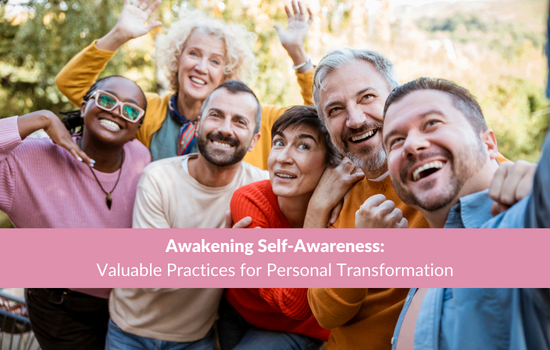Knowing our emotions and learning to manage them will differentiate us from others and guide our success. Begin your transformation by developing self-awareness to improve emotional intelligence.
The Path to Self-Awareness: Valuable Techniques for Personal Growth

Self-awareness, a key component of emotional intelligence, is your ability to correctly recognize your emotions and be mindful of them as they occur. We use our self-awareness skills to notice our feelings and judge if our needs are satisfied.
Developing Self-Awareness to Manage Emotions
As you can imagine, these skills come in handy virtually every day, in almost every interaction, including with ourselves! Strong self-awareness is necessary to succeed; lacking it will limit our potential.
Here's the good news: You CAN develop your self-awareness, improving your emotional intelligence.
To do so, you must start identifying what you do well – your strengths and the skills you need to develop – your weaknesses. Once you understand your skill level, you can learn to lead with your strengths and develop strategies to strengthen the skills you need to build.
Nine Helpful Ways to Develop Self-Awareness
You can strengthen your emotional intelligence immediately just by becoming more self-aware. Self-awareness is a valuable skill that can lead to personal growth and improved relationships. Here are some ways to cultivate self-awareness:
- Practice mindfulness: Engage in activities that promote present-moment awareness, such as meditation or deep breathing exercises. Mindfulness helps you observe your thoughts, feelings, and sensations without judgment.
- Reflect on your experiences: Regularly reflect on your actions, choices, and the outcomes they produce. Consider how your behaviour aligns with your values and goals. Try this quick Self-Reflection Exercise
- Seek feedback from others: Ask trusted friends, family members, or mentors for honest opinions about your strengths, weaknesses, and blind spots. Their insights can provide valuable perspectives.
- Keep a journal: Write your thoughts, emotions, and observations regularly. This practice can help you identify patterns, triggers, and recurring themes. Start journaling today.
- Practice introspection: Set aside dedicated time to engage in self-reflection. Ask .yourself thought-provoking questions about your beliefs, motivations, and aspirations. Be open to exploring deeper layers of your identity.
- Take personality assessments: Utilize reputable personality assessments, such as the Myers-Briggs Type Indicator (MBTI) or the Big Five Personality Traits, to gain insights into your personality traits and preferences.
- Engage in self-observation: Pay attention to your thoughts, emotions, and physical sensations throughout the day. Notice how external events impact your internal state and vice versa.
- Cultivate empathy: Practice putting yourself in others' shoes and considering their perspectives. This can enhance your understanding of yourself and improve your interpersonal relationships.
- Embrace self-acceptance: Accept yourself as you are, including your strengths, weaknesses, and imperfections. Embracing self-compassion and self-acceptance allows for genuine self-awareness to develop.
Self-awareness, a core emotional intelligent competency, provides insight into establishing and maintaining positive relationships. Developing self-awareness is a continuous process that requires patience and dedication. Embrace the journey and be open to self-discovery along the way.
Adopt a growth mindset to become more aware of your emotions and realize your goals. For one-on-one guidance with reaching your goals, including self-development, team building, employee relationships, and more, Click here?
This article was originally published on January 19, 2019, and has been updated (July 2023).
More Motivational Reads Here »
How Emotionally Intelligent Are You?
Sign up for Linda’s monthly tips to build your Emotional Intelligence and reduce Emotional Hijacking!

















